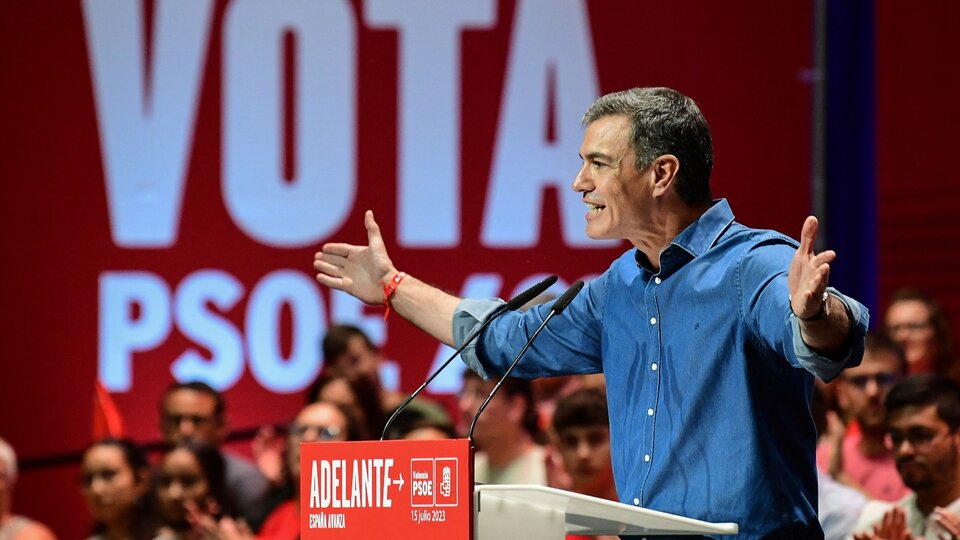One week before the general elections in Spain, the opposition Popular Party (PP) is positioned as the closest political group to reach the majority of the votesaccording to the polls, which would allow him to form the new Congress.
The conservative PP arrives at these elections with the impulse that his victory in the regional and municipal elections of the last May 28in which he snatched important mayoralties from the Socialists such as those of Seville and Valencia, in addition to revalidating with an absolute majority the governments in the city and in the commune of Madrid.
With this adverse result, the President of the Spanish Government and leader of the PSOE, Pedro Sanchezgave a rudder stroke: dissolved Congress and brought forward the general elections by six months scheduled for the end of the year, and now the decision is in the hands of the 37.4 million citizens eligible to vote, which includes 2.3 million residents abroad, according to figures published by the National Institute of Statistics .
a heated debate
Sánchez and Núñez Feijóo sparked sparks during the debate that took place on Monday, the only one in this campaign. There were constant disputes and interruptions between the candidates when discussing the political and economic situation in Spain. In this sense, the head of the Government claimed issues such as job creation, inflation control, growth and labor reform. “We cannot swerve, because Feijóo and (the president of Vox, Santiago) Abascal aspire to repeal all this, they will put a brake on them,” he argued.
Feijóo replied that Sánchez’s management is one of those that has created the least employment since the recovery of democracy, only ahead of the administration of the also socialist Jose Luis Rodriguez Zapatero. In addition, he criticized the “little stability” of the Executive’s policies, which was reflected in the appointment of “more than 40 ministers”, and maintained that his opponent “makes up” the unemployment statistics.
The debate also seemed to mark a change in tactics by the PP, when the opposition leader challenged the current president to sign an agreement so that the latter supports the party with the most votes in the July 23 elections, which would settle the problem of reaching an absolute majority in the Chamber to designate the new government. The PSOE leader, for his part, rejected the proposal, alleging that the PP is asking for what it refused to do on other occasions.
The situation became even more tense when it came to talking about social policy and equality, in which the opposition leader blamed the socialist for the 117 sexual offenders and pedophiles who were released since the entry into force last year of the known as the law of “only yes is yes”, which had to be reformed later with the support of the PP. As a defense, Sánchez reproached him for the pacts that the Popular Party is carrying out with the extreme right in Spanish municipalities and regions, which will lead, in his opinion, the country “to obscurantism.”
anti rights coalition
In the May elections, Vox also did well, which leads Santiago Abascal. It is a far-right political party that intends to integrate with its own weight a coalition led by the PP. Two weeks ago they agreed to jointly lead the region of Extremadura, the third of its kind after Castilla y León, since last year, and Valencia, one of the richest regions in the country, where the agreement was reached in mid-June. . In addition to these three regions -of the 17 that Spain has-, they closed a pact in the Mediterranean archipelago of the Balearic Islands, so that the conservatives govern alone but with the support of Vox in the regional Parliament.
The fine print of the consensus consists of setting an agenda that reverses the achievements and social laws of the current Governmentespecially on issues such as immigration policies, international alignment and recognition of the rights of LGTBIQ+ groups, among others.
The Spanish Parliament approved a law in February that allows those over 16 years of age to freely change their gender without the need for judicial, parental or medical authorization. The conservatives of the PP promised to repeal the legislation if they win the next elections. “Attempts against minors, violates the guardianship and guardianship of parents, against common sense”, because “it is much easier to legally change sex than to approve the selectivity, than to get a driver’s license”, he reproached in June the leader of the PP, Alberto Núñez Feijóo.
According to AFP, In some towns, due to pressure from Vox, the rainbow flag, a symbol of the LGBTIQ+ community, was not placed or removed from public buildings during Pride month. Likewise, he displayed a huge banner in which he invited to throw it away. “This party is not only a threat to feminists, but also to the LGTBIQ + collective and to immigrants,” she told Euronews Patricia Aranguren, from the Madrid 8M Commission. And she said: “We are determined not to let them take away any of our hard-earned gains if they come to power.”


